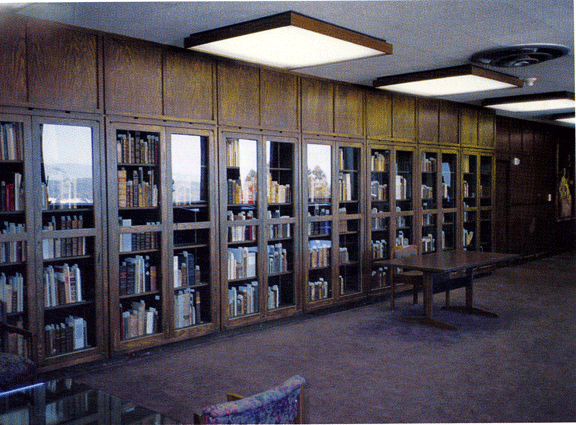USF: Collecting Dust
- by Bruce E. McKinney

The Donohue: Facilities in search of an audience
If these constituencies are difficult to deal with, then think about the donors. These are people who give their valuable collections and a piece of their identities to libraries, believing only that the library will appreciate their books as much as they do, and preserve their collection, and the memory of its donor, in perpetuity. Instead, they find their gift is as perpetual as a Hong Kong or old English burial. Alas poor Yorick. Such a donor may feel used or cheated. From a practical standpoint, who will give so freely of himself in the future if they believe this perpetual gift may soon be converted to short-term cash?
Of course, the issues raised here go way beyond the University of San Francisco. What happens to the rare book room at one relatively small Jesuit institution does not matter that much to those outside the confines of its small rare book community. Nonetheless, this has touched off a firestorm. The University of San Francisco, unwittingly and unwillingly, has become a test case for the role of rare book libraries in the 21st century. This is an uncomfortable place to be, and the university is trying its best to extricate itself from the position. The University has responded by saying the controversy is essentially a misunderstanding. Perhaps they are right, but the issues the case has raised will not go away, and we shall return to them as soon as we explain the University's position, and why they believe far more has been made of their particular case than it warrants.
Most have seen San Francisco's action as a raid on the rare book room to raise cash. In difficult times such as these, some may find this understandable, others inexcusable, but this is a decision many institutions are likely to confront in the days ahead, as the need for cash rises and the role of libraries changes. However, officials at the University of San Francisco say this is an inaccurate portrayal of their particular case. Rather than a signal event in the relationship between university and library that threatens the very existence of the rare book room, San Francisco sees this as a small dispersal necessary to save the library. Gary McDonald, AVP of Communications and Public Affairs at San Francisco, explains the sequence of events this way: "The room that currently houses the collection is inadequate: it does not offer proper controls for humidity, temperature, lighting or protection from fire. Expensive upgrades are necessary to ensure the collection's long-term survival."
The University determined that the upgrades necessary to preserve the collection would cost $1.3 million. Unwilling to impose these costs on students through higher tuition or fees, President Privett met with the Gleeson Library Associates [Friends of the Library] to ask for help in raising the funds, but a year later, none has been raised. The University still hopes someone will come forward with a generous gift, "but with no real prospects for raising the money, USF made the difficult decision to sell a handful of objects (out of a collection of approximately 20,000 items) from the rare book room to generate the funds necessary to protect the collection at large. Every penny realized from their sale will be invested in the necessary upgrades. None of the money is going to the university's general operating budget."
Mr. McDonald concludes his written response by asking, "What purpose is served if USF owns a rare book but does not care for it properly? The real issue is the university's determination to provide the necessary long-term care of this precious asset so that it can be enjoyed by generations to come."